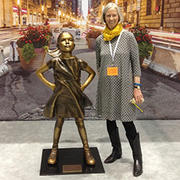
Anne Marie Hunter, MDiv '86, director of Safe Havens Interfaith Partnership Against Domestic Violence and Elder Abuse, delivered the following remarks at Morning Prayers in Harvard's Memorial Church on October 12, 2018.
♦♦♦
This morning’s reading features Psalm 22 interwoven with the recent testimony of Dr. Christine Blasey Ford.
Psalm 22: My God, my God, why have you forsaken me? I cry by day, but you do not answer, and at night, but find no rest.
Ford: “I am here not because I want to be. I am terrified.”
Psalm 22: O God, I am a worm and not human, scorned by men. All who see me mock me.
Ford: “Indelible in the hippocampus is the laughter, the laugh—the uproarious laughter between the two, and their having fun at my expense.”
Psalm 22: They wag their heads: “She committed her cause to the Lord, let God deliver her.”
Ford: “I was calculating daily the risk/benefit ... of coming forward, and wondering whether I would ... just be personally annihilated.”
Psalm 22: O God, be not far from me, for trouble is near and there is none to help.
Ford: “I did not want to tell my parents ... I convinced myself that ... I should just move on and ... pretend that it didn’t happen.”
Psalm 22: Many bulls encompass me, they open wide their mouths at me, like a roaring lion.
Ford: “My greatest fears have been realized. I’ve had to relive this trauma in front of the world.”
Psalm 22: O God, I am poured out like water, and all my bones are out of joint. My strength is dried up. I am laid in the dust of death.
Ford: “I thought he was going to accidentally kill me.”
Psalm 22: O God, a company of evildoers encircle me.
Ford: “This assault drastically altered my life. For a very long time, I was too afraid and ashamed to tell anyone these details.”
Psalm 22: O God, be not far off. Deliver my soul from the sword and my life from the mouth of the lion.
Ford: “The details about that night ... I will never forget. They have been seared into my memory, and have haunted me ... as an adult.”
May God bless those who wrestle with these words.
There is a crisis in the United States today. One in four women and one in 10 men will experience violence at the hands of an intimate partner, and one in three women and one in six men will experience sexual violence. Twenty to 25 percent of college women and 15 percent of college men are victims of sexual assault (National Sexual Violence Resource Center). Multiracial and American Indian/Alaska Native women disproportionately experience sexual assault, while 6 percent of LGBT individuals are assaulted because of their sexual orientation or gender identity (NSVRC).
Every survivor in the country watched Dr. Blasey Ford’s testimony with their heart in their throat, hoping that this time it would be different, this time the survivor would be believed, not blamed or made fun of. Instead she was called a “hoax” and a “pawn in a vast political machine.”
We can do better.
I’m going to assume that faith is important to each of you because you are sitting in Memorial Church early on a Friday morning. And I’m going to assume you are leaders because you are at Harvard. Survivors need your help.
When survivors reach out for help, they are more likely to reach out to family, friends, or a trusted person of faith for help than they are to call police or a hotline (Georgia Domestic Violence Coalition). Abuse is a spiritual as well as a physical and emotional crisis, and healing and justice often have spiritual components. So survivors turn to faithful people for help. That makes us all “first responders.”
Audre Lorde says that social change happens when people move from silence to naming to action (Sister Outsider). We have had generations of silence. October is Domestic Violence Awareness Month, and the #whyIstayed, #whyIleft, and #metoo movements, as well as the testimony of Dr. Blasey Ford, have begun to name our experiences. It’s time for action.
- Learn more. Start with the Safe Havens website at interfaithpartners.org.
- Break your silence. Make your support of survivors visible. Wear purple on October 18, put up a poster, take a stand.
- Listen to and believe survivors. David Augsberger says, “Being listened to is so close to being loved most people can’t tell the difference.”
- Dismantle the racism, classism, and privilege that make victims from marginalized communities especially vulnerable.
- Support local services. We should ALWAYS refer survivors to local sexual and domestic violence services, and to do that we need strong local services.
As people of faith, we have a unique role to play in responding to victims, educating our communities, and speaking out to end intimate partner and sexual violence. We are the ones, and we will do it.
